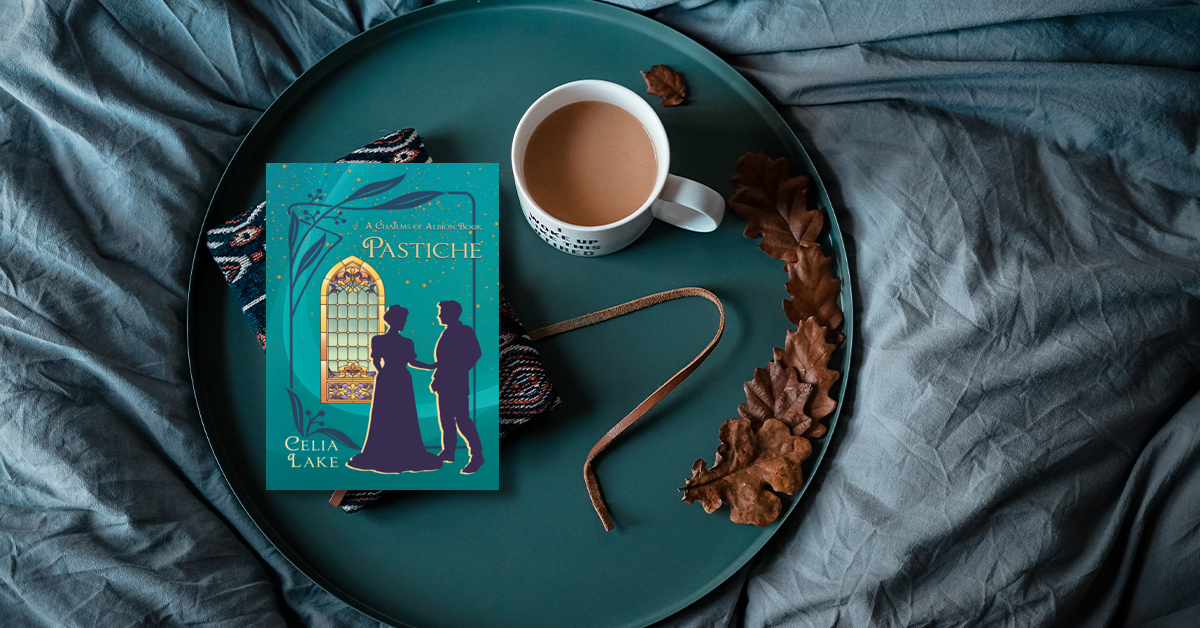Pastiche is my first Edwardian book, mostly set in 1906. That year turns out to be interesting for medical history reasons, but it’s also in the middle of a period rich in artistic and creative activity.

Living well with chronic illness
Alysoun, the heroine of this book, lives with what we’d call fibromyalgia today. At the time of the book, they don’t quite have a name for it: fibrositis (the earlier name) shows up in the medical literature for the first time late in 1906.
What she knows is that her body aches – often and also unpredictably. She struggles with fatigue and brain fog, wanting to have an engaged and active life, and yet also not wanting to spend her limited time and energy on social events she doesn’t enjoy.
The trick is that she is Lady Alysoun, married to Lord Richard, who not only has those obligations to the land magic, but who is also a member of the Guard (Albion’s equivalent to the police, more on that in the next section), and who is asked to become a magistrate in the course of the book. Being a magistrate comes with a number of additional social obligations for both of them, as well.
My chronic health stuff is not exactly the same as Alysoun’s – though at points in my life, I have had a lot more of all of her main symptoms than I do at the moment (if sometimes in slightly different modes.) Writing that experience, however, comes straight from my desire to have someone like me be loved, have pleasure, and find a place in the world that suits her.
Alysoun’s experiences are also rooted in many conversations I’ve had with a dear friend who shares some of her symptoms too. Specifically, “If I’m going to hurt if I don’t do this thing that would also bring me pleasure, and I’m going to hurt if I do (maybe a bit more), I’d rather have the pleasure, too.” Navigating that, moment to moment, day to day, year to year, is always a trick. Alysoun’s still learning it in Pastiche, but has found a lot more rhythm and balance by the 1920s, and the later books we see her in.
Now, this is Albion, and so there is a touch of fantasy here. Veritas, the Edgarton family home, started as a Roman villa, and the hypocaust system has been tended over many years. She can therefore retreat to a series of baths I absolutely envy, including the deep multi-person hot soaking tub.
The Guard, power, and responsibility
I wrote the draft of Pastiche between November 2019 and February 2020. I was editing it over the summer of 2020, as George Floyd was murdered by police officers in Minneapolis. (I lived in the Twin Cities for more than a decade, my last few not too far from Lake Street and Minnehaha Ave.)
I did a lot of thinking about this particular book, about the history of policing, about the ways any system (and especially those dealing with authority and law enforcement) can be abused and manipulated. I did a lot of talking with my editor, Kiya.
For one thing, while British policing isn’t perfect either, as I did more and more research, I realised that the history of how organised policing developed was rather different. (And in Albion, coordinated law enforcement in various forms became urgently needed following the Pact in 1484 and establishment of additional portals and means of rapid transporation in the next couple of hundred years.)
I also thought about what I’d already established in Albion (Wards of the Roses features Kate Davies, my other character who is a member of the Guard proper, though in that case, very much in an investigative magical role.)
And I looked at what I’d already embedded in both this book in particular, and in the larger world: the idea of magically enforceable oaths. Every magical person in Albion makes one at the age of 12, and various other professions and occupations make them as well. (Pastiche in fact already had the scenes of Richard taking the magistrate’s oath and the effect it has on him.)
Here’s the thing that was already in the draft, but that I expanded far more thoroughly:
The Guard make something that’s equivalent to a chivalric oath, as Richard describes in the book. It isn’t a perfect protection, but it does mean that people who wish to abuse their power tend to fail out of apprenticeship or are redirected into other roles.
And as Richard points out, a lot of their work is more about solving problems, directing people to appropriate help, seeing to the actual physical and magical safety of people in the community. (This last part is particuarly important since people experimenting with magic they don’t fully understand can have a wide range of implications for the safety of those around them.)
It’s a complicated issue, and a complicated role.
Arranged marriage to love match
I first wrote about Richard in Outcrossing and Alysoun and Richard both appear in Wards of the Roses and On The Bias, where it is clear they adore each other and work well in tandem.
But I also knew they’d been basically an arranged marriage, and I wanted to know how they fell in love.
They married knowing of each other (similar family circles) but not knowing each other well. They married more rapidly than they might have due to Richard’s father’s decline in health. And for the first few years, they are cordial and pleasant, but not close.
Richard had been brought up not to be a bother to women (his mother, who is not a pleasant human, had strong opinions about this.) He thinks he’s being polite and considerate, when Alysoun deeply wants more of his time, attention, and preferably affection. It’s only through the events of the book (and a bit of help from those who are wiser in these things) that they figure out how to navigate that.
(When my beta readers got their hands on this one, they left comments of “RICHARD, TALK TO YOUR WIFE” in many places.)
More of the Edgartons
It turns out I can’t let them go! They have secondary roles in a number of my other books so far (as well as some upcoming works.)
Richard appears briefly at the end of Outcrossing (in his role as Captain of the Guard) as well as in Complementary, when he gives an assignment to Elizabeth Mason. Richard is Kate’s commanding officer during Wards of the Roses (and Alysoun appears at the end.) They’re both present and helpful during the climactic events of On The Bias.
And then there’s Gabe. Their son has his own romance in The Fossil Door, and his parents also make an appearance in the extras associated with that book. (Sign up for my newsletter to get access to those and upcoming extras.)
They’ll also be making an appearance in Ancient Trust (a prequel novella about Geoffrey Carillon inheriting his title, available in the summer of 2022) and Best Foot Forward (out in November 2022) and some of the extras for that. I’m also chewing on a book about Charlotte, their daughter, though I’m not yet sure exactly where that will fall in my upcoming writing plans.

